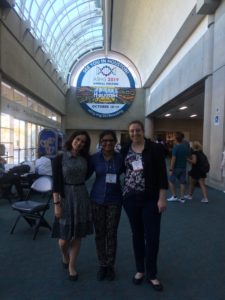Recap: 2018 Meeting of the American Society of Human Genetics
by Abin Abraham (G2) and Ayesha Muhammad (G1)

A number of current MSTP trainees attended the annual meeting of the American Society of Human Genetics (ASHG) this month at San Diego. The conference included over 9,000 people in attendance including graduate students, genetic counselors, and even start-up companies. Vanderbilt MSTP was well-represented with abstracts and posters, including from Tory Martucci (G3), Abin Abraham (G2) and Katherine Konvinse (G4).
The keynote was lead by three speakers: John Hawks, Ph.D., an anthropologist from University of Wisconsin Madison, Himla Soodyall, Ph.D., a geneticist from National Health Laboratory Service and University of the Witwatersrand, and Ambroise Wonkam, M.D., Ph.D., physician-scientist from University of Cape Town. The theme of the three talks was the origins of the human species in Africa. The African continent is special not only because we believe it is the origin of the modern human, but also for its incredible genetic diversity. The out of Africa migration lead to the population of the rest the world. This event created a dramatic genetic bottleneck that limited the African genetic diversity from being inherited to subsequent populations. The speakers, especially Dr. Wonkam, highlighted an important ethical challenge the human genetics societies faces today: the lack of research into non-European populations, which unfortunately ends up contributing to clinical and health disparities as well. To truly understand how the human genome works we must study the African genomic variation. Several examples during the keynote speeches underscored how understanding the African variation can yield insights that can inform treatment for all individuals. This conversation was also especially timely, given the recent use of genetic research to supplement people’s political philosophies. Overall, the conference was not only an exhilarating opportunity to nourish scientific curiosities, but also to appreciate the ethical dilemmas that face the community: for a field with such rapid growth and technological advances, the educational/ethics resources are lagging behind. As physician-scientists, where we will be interacting with not only experts in the field, but patients with varying levels of knowledge, we can offer unique perspectives to lead such conversations.